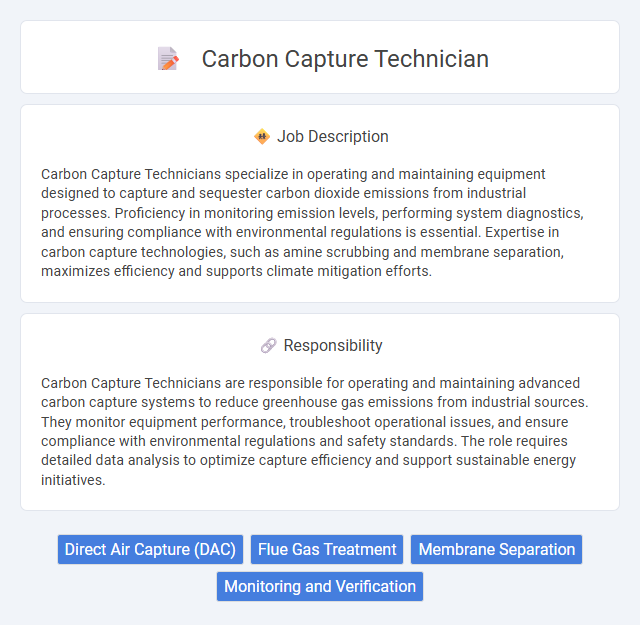
Carbon Capture Technicians specialize in operating and maintaining equipment designed to capture and sequester carbon dioxide emissions from industrial processes. Proficiency in monitoring emission levels, performing system diagnostics, and ensuring compliance with environmental regulations is essential. Expertise in carbon capture technologies, such as amine scrubbing and membrane separation, maximizes efficiency and supports climate mitigation efforts.
Individuals with a strong interest in environmental technology and hands-on technical work may be well-suited for a Carbon Capture Technician role. Those comfortable working in industrial settings and handling complex machinery might find the position fulfilling. People who prefer routine tasks or office-based jobs may have a lower probability of thriving in this physically demanding and dynamic occupation.
Qualification
A Carbon Capture Technician must have specialized training in environmental science, chemical engineering, or a related technical field, often requiring an associate degree or certification in carbon capture technologies. Proficiency in operating and maintaining carbon capture systems, including knowledge of membrane separation, absorption, and cryogenic processes, is essential. Strong analytical skills, safety compliance experience, and the ability to troubleshoot complex equipment ensure effective capture and storage of carbon dioxide emissions.
Responsibility
Carbon Capture Technicians are responsible for operating and maintaining advanced carbon capture systems to reduce greenhouse gas emissions from industrial sources. They monitor equipment performance, troubleshoot operational issues, and ensure compliance with environmental regulations and safety standards. The role requires detailed data analysis to optimize capture efficiency and support sustainable energy initiatives.
Benefit
A Carbon Capture Technician role likely offers significant benefits, including competitive salaries and opportunities for career growth in the renewable energy sector. Access to advanced technology and specialized training may enhance skill development and job security. Employees could also enjoy contributing to environmental sustainability, which may increase job satisfaction and potential incentives.
Challenge
The role of a Carbon Capture Technician is likely to involve complex challenges related to efficiently capturing and storing carbon emissions from industrial processes. Technicians may frequently encounter issues with equipment maintenance and system optimization to ensure maximum carbon capture rates. Problem-solving skills and adaptability are probably essential for overcoming operational setbacks and advancing technology effectiveness.
Career Advancement
A career as a Carbon Capture Technician offers significant opportunities for advancement in the growing clean energy sector. Professionals with expertise in Carbon Capture, Utilization, and Storage (CCUS) technologies can progress to roles such as Lead Technician, Project Manager, or Environmental Engineer. Gaining certifications in carbon management and environmental compliance enhances prospects for leadership positions within sustainability-focused organizations and energy companies.
Key Terms
Direct Air Capture (DAC)
Carbon Capture Technicians specializing in Direct Air Capture (DAC) operate sophisticated systems that extract CO2 directly from the atmosphere using chemical processes and advanced filtration technology. They monitor and maintain equipment such as air contactors and sorbents to ensure optimal carbon dioxide removal efficiency, playing a crucial role in mitigating climate change. Expertise in system diagnostics, data analysis, and environmental compliance is essential for maximizing the impact of DAC facilities.
Flue Gas Treatment
Carbon Capture Technicians specializing in Flue Gas Treatment operate advanced systems to remove CO2 from industrial emissions, enhancing environmental compliance and reducing greenhouse gases. They monitor, maintain, and optimize absorption and chemical scrubbing processes, ensuring efficient capture of carbon dioxide from flue gases. Expertise in handling amine solvents, process instrumentation, and safety protocols is essential for maximizing capture rates and minimizing operational downtime.
Membrane Separation
Carbon Capture Technicians specializing in membrane separation operate and maintain advanced filtration systems that selectively remove CO2 from industrial emissions. Utilizing polymeric or ceramic membranes, they ensure optimal gas permeability and separation efficiency to maximize carbon capture rates. Expertise in membrane materials science and process control enables technicians to improve sustainability in carbon-intensive industries by reducing greenhouse gas emissions.
Monitoring and Verification
Carbon Capture Technicians specialize in Monitoring and Verification (M&V) processes to ensure the efficiency and integrity of carbon sequestration systems. They utilize advanced sensors, data acquisition tools, and software platforms to continuously track CO2 emissions, storage conditions, and system performance metrics. Accurate data analysis and real-time reporting validate compliance with environmental regulations and support optimization of carbon capture technologies.
 kuljobs.com
kuljobs.com